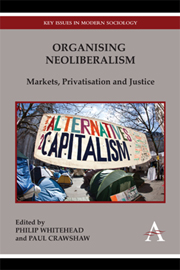Book contents
- Frontmatter
- Contents
- Chapter 1 Introduction: A Preliminary Mapping of the Terrain
- Chapter 2 Neoliberalism and Crime in the United States and the United Kingdom
- Chapter 3 Neoliberalism, Prisons and Probation in the United States and England and Wales
- Chapter 4 The Neoliberal Wings of the ‘Smoke-Breathing Dragon’: The Cigarette Counterfeiting Business and Economic Development in the People's Republic of China
- Chapter 5 A Neoliberal Security Complex?
- Chapter 6 The Influence of Neoliberalism on the Development of the English Youth Justice System under New Labour
- Chapter 7 Institutionalising Commercialism? The Case of Social Marketing for Health in the United Kingdom
- Chapter 8 Neoliberal Policy, Quality and Inequality in Undergraduate Degrees
- Chapter 9 Religion and Criminal Justice in Canada, England and Wales: Community Chaplaincy and Resistance to the Surging Tide of Neoliberal Orthodoxy
- Chapter 10 Markets, Privatisation and Justice: Some Critical Reflections
- Notes on Contributors
- Index
Chapter 9 - Religion and Criminal Justice in Canada, England and Wales: Community Chaplaincy and Resistance to the Surging Tide of Neoliberal Orthodoxy
Published online by Cambridge University Press: 05 February 2013
- Frontmatter
- Contents
- Chapter 1 Introduction: A Preliminary Mapping of the Terrain
- Chapter 2 Neoliberalism and Crime in the United States and the United Kingdom
- Chapter 3 Neoliberalism, Prisons and Probation in the United States and England and Wales
- Chapter 4 The Neoliberal Wings of the ‘Smoke-Breathing Dragon’: The Cigarette Counterfeiting Business and Economic Development in the People's Republic of China
- Chapter 5 A Neoliberal Security Complex?
- Chapter 6 The Influence of Neoliberalism on the Development of the English Youth Justice System under New Labour
- Chapter 7 Institutionalising Commercialism? The Case of Social Marketing for Health in the United Kingdom
- Chapter 8 Neoliberal Policy, Quality and Inequality in Undergraduate Degrees
- Chapter 9 Religion and Criminal Justice in Canada, England and Wales: Community Chaplaincy and Resistance to the Surging Tide of Neoliberal Orthodoxy
- Chapter 10 Markets, Privatisation and Justice: Some Critical Reflections
- Notes on Contributors
- Index
Summary
Introduction
Throughout its notorious history and accompanying robust longevity, capitalism has spewed its floodwaters upon human bodies and institutional formations. Capitalism has not only survived since the late eighteenth century, but has done so despite periodic crises (Arrighi 2010), the critique of alternative ideologies and its questionable moral and social impacts. Even its deleterious effects upon individuals and families, the ravaging of local communities, the capacity to inflict human suffering through inequality and poverty, have not distracted from its relentless ability to renew itself. Capitalism survived the crisis decade of the 1970s as President Reagan and Prime Minister Thatcher fashioned a neoliberal resurgence with an evangelical fervour expressed in the refrain, “There Is No Alternative’. The most recent crisis, which erupted in 2007, precipitated by banking malfeasance (Crouch 2011; Duménil and Lévy 2011), added to the murky deposits and pushed the water mark even higher so that the election of a Conservative–Liberal coalition government in England and Wales in May 2010 signalled a critical moment for the capitalist–neoliberal meat grinder. The optimistic forecast is that the Liberal component of the two-party governmental coalition will act as a moderating influence upon the Neocons, so that things will not be as bad compared to the situation if the Conservatives governed alone. This is the Liberal Democrat “neutralisation of worst fears’ thesis. In marked contrast, the gathering storm warning is that by 2015 the neoliberal upsurge will have unleashed destructive forces into the social body on the back of financial restructuring that produces economic benefits for the few (or even fewer), at the cost of greater socio-economic insecurity for the many (or even more).
- Type
- Chapter
- Information
- Organising NeoliberalismMarkets, Privatisation and Justice, pp. 201 - 228Publisher: Anthem PressPrint publication year: 2012

